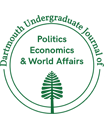Abstract
This paper delves into the known aspects and political actions of Korean Christian churches to explore both their underlying causes and their broader social effects. Much of the scholarship on this period has pointed to the various actors who took part in the pro-democracy movement. However, it is equally important to explore the ties between these organizations, facilitated by the church as a social institution. While much scholarship has pointed out official joint-declarations and coalitions, this paper seeks to explore how aspects of the church itself created interpersonal networks among protesters and shaped their political action, not just as Christians but as members of the other major groups identified with the pro-democracy protests as well.
Recommended Citation
Matheson, Will
(2019)
"Faith in Democracy: Korean Churches as Engines of Pro-Democracy Protest,"
Dartmouth Undergraduate Journal of Politics, Economics and World Affairs: Vol. 1:
Iss.
2, Article 7.
Available at:
https://digitalcommons.dartmouth.edu/dujpew/vol1/iss2/7
Included in
Civic and Community Engagement Commons, Political Science Commons, Politics and Social Change Commons, Sociology of Religion Commons


